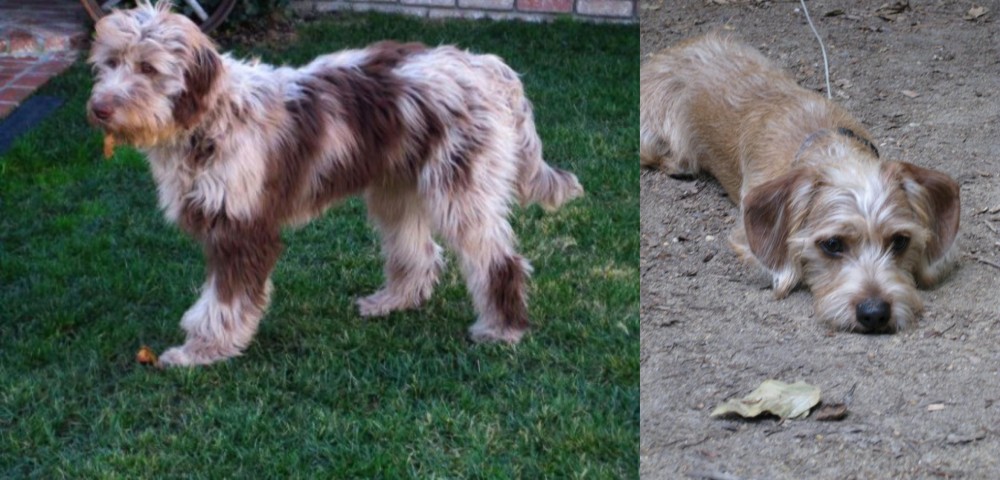 Petzlover
Petzlover Aussie Doodles is originated from United States but Schweenie is originated from United Kingdom. Both Aussie Doodles and Schweenie are of same height. Aussie Doodles may weigh 22 kg / 49 pounds more than Schweenie. Aussie Doodles may live 3 years less than Schweenie. Both Aussie Doodles and Schweenie has almost same litter size. Aussie Doodles requires Moderate Maintenance. But Schweenie requires Low Maintenance
Aussie Doodles is originated from United States but Schweenie is originated from United Kingdom. Both Aussie Doodles and Schweenie are of same height. Aussie Doodles may weigh 22 kg / 49 pounds more than Schweenie. Aussie Doodles may live 3 years less than Schweenie. Both Aussie Doodles and Schweenie has almost same litter size. Aussie Doodles requires Moderate Maintenance. But Schweenie requires Low Maintenance
 It is interesting to note that the Australian Shepherd doesn’t have much in common with the land ‘down under’. The dog has always been a popular companion dog in the United States as a working dog. As a hybrid, the Aussiedoodle is a new breed that doesn’t have a detailed history, but it is worth taking not that the 2 breeds that have been used to create the Aussiedoodle do have long histories each.
It is interesting to note that the Australian Shepherd doesn’t have much in common with the land ‘down under’. The dog has always been a popular companion dog in the United States as a working dog. As a hybrid, the Aussiedoodle is a new breed that doesn’t have a detailed history, but it is worth taking not that the 2 breeds that have been used to create the Aussiedoodle do have long histories each.
It is believed that the name of the Australian Shepherd is because the ancestors of the dog arrived from Australia in the United States and were named from where their ancestors previously resided. The Aussiedoodle has only emerged on the scene in the last 10 years and is becoming hugely popular. The breed isn’t recognized by the American Kennel Club but are recognized by the American Canine Hybrid Club.
 The Schweenie is a hybrid dog, with the parent breeds being the Shih Tzu and the Dachshund.
The Schweenie is a hybrid dog, with the parent breeds being the Shih Tzu and the Dachshund.
The Schweenie dog has been around for about 4 decades when breeders were looking for a dog that would be free of the health issues of the purebred parent breeds.
Because the Schweenie is a mix breed, it doesn’t qualify to be part of the American Kennel Club. He is however recognized by the Designer Breed Registry and some other clubs.
 The Australian Shepherd was bred to herd livestock together, and with the Aussiedoodle, you’ll still sometimes see this trait, and he may well try to herd his human family into the car. The Aussiedoodle can’t always be expected to look the same as they come in many sizes and shades of colour, some leaning more towards the Poodle and others more towards the Australian Shepherd. He is a medium- to large sized dog with a strong-boned, muscular structure.
The Australian Shepherd was bred to herd livestock together, and with the Aussiedoodle, you’ll still sometimes see this trait, and he may well try to herd his human family into the car. The Aussiedoodle can’t always be expected to look the same as they come in many sizes and shades of colour, some leaning more towards the Poodle and others more towards the Australian Shepherd. He is a medium- to large sized dog with a strong-boned, muscular structure.
The coat of the Aussiedoodle can differ somewhat, with most having wavy or curly hair while others have fairly straight hair. The dogs are available in many different colours, from solids to patterned and in shades such as black, grey, silver and blue merles. Size can vary too, depending on whether the Aussiedoodle had a miniature or standard poople involved with the pairing.
The Aussiedoodle is exceptionally clever and also very energetic. This dog breed will require training, socialization and exercise. Training an Aussiedoodle is easy as you will see he is eager to please.
The Aussiedoodle loves his family and this isn’t a dog that can be left outdoors all day on his own. He is lively and energetic, and left too long on his own, he can become bored and destructive. This hybrid makes the perfect pet for families with kids, with no aggressive tendencies. He can also be introduced to other pets in the home as he is a friendly, amicable breed who wants to please.
 The Schweenie will be a smallish dog standing at roughly 27cm to 50cm and weighing 4 – 9kg.
The Schweenie will be a smallish dog standing at roughly 27cm to 50cm and weighing 4 – 9kg.
Because of the Dachshund parent, he will likely have a long body. The coat is shortish to medium length and can be a variety of colors – from a rusty color to brown, black, grey and even a cream shade. The ears are floppy and the tail medium length.
He is a small dog who is smart and bright and who wants to please his human owners. He loves people and wants to be around them and involved in their activities.
Small and cute though he is, he can be a stubborn dog and become a little big aggressive too if he is feeling a bit moody. He will need to be trained and socialized if you want him to obey your simple commands such as sit, stay, lie down and come.
He is intelligent enough to learn these simple commands with ease.He is both alert and vigilant, and this makes them good watchdogs.
 The Aussiedoodle is an intelligent, outgoing, patient and devoted family pet who will happily slot into any home where there are children and other pets.
The Aussiedoodle is an intelligent, outgoing, patient and devoted family pet who will happily slot into any home where there are children and other pets.
Most Aussiedoodles love being active and you’ll want to include him in all your activities – walking, swimming, ball games and herding.
Yes, it is true that the temperament of your Aussiedoodle will depend on the canine parents but he will also be influenced by your lifestyle and environment too.
 The Schweenie can be somewhat reserved and they need exercise regularly as well. If they don’t get enough exercise, they tend to become jittery and this can make them become a bit snappy. The are more prone to be snappy and aggressive with children who haven’t been taught how to treat animals gently and with respect.
The Schweenie can be somewhat reserved and they need exercise regularly as well. If they don’t get enough exercise, they tend to become jittery and this can make them become a bit snappy. The are more prone to be snappy and aggressive with children who haven’t been taught how to treat animals gently and with respect.
They’re small enough to adjust to life in the city or countryside but will still need to be exercised.
The little Schweenie, with the right kind of owner can become a great little pet and companion.
 As with most mixed-breeds, Aussiedoodles are a healthy breed, and your pet won’t come with any hereditary ailments. Both Australian Shepherds and Poodles have few inherent diseases, and by mixing the two, you get a robust breed.
As with most mixed-breeds, Aussiedoodles are a healthy breed, and your pet won’t come with any hereditary ailments. Both Australian Shepherds and Poodles have few inherent diseases, and by mixing the two, you get a robust breed.
Having said that, you always have to be aware that any dog, including your Aussiedoodle can inherit certain health problems of both the Poodle and the Australian Shepherd.
The Australian Shepherd is susceptible to vision problems and some health problems with the Poodle include epilepsy, renal disease and cancer, but in spit of this, the good news is that there aren’t many documented health issues with Aussiedoodles.
Always research and find a reputable breeder of Aussiedoodles who has certificates that the parents are sound and free from common health defects. Make sure that you get your puppy vaccinated from 8 weeks of age to avoid the common, deadly canine diseases that can rob you of your puppy. The very first vaccination will be for distemper, measles and parainfluenza.
 With good care, your Schweenie can live to be 12 to 15 years of age. Every dog, no matter how healthy, can get some of the health problems that plague many dogs.
With good care, your Schweenie can live to be 12 to 15 years of age. Every dog, no matter how healthy, can get some of the health problems that plague many dogs.
This is where the cushions between each vertebra come into contact with the spinal cord. It can result in nerve damage and sometimes even paralysis. Because the Shih Tzu is one of the parent breeds, you will need to be aware of this ailment as these dogs are more susceptible to this disease.
Hypoglycemia is fairly common in small dogs and it is where there is a drop in blood sugar. It can be brought on by stress. It can also be referred to as low blood sugar and it can be deadly. If your pet is hypoglycemic, you will notice a loss in appetite, extreme lethargy, trembling and unusual behavior. You will need to get your Schweenie to the vet immediately for tests and treatment.
 The coat of Aussiedoodles need minimal maintenance. This is because of the Poodle input which is a low shedding dog. Aussiedoodles shed very little, but you will still need to give your dog a regular brush every other day to remove loose hairs and to also prevent matting. You can even include some professional grooming as his thick coat can quickly look dirty and unruly.
The coat of Aussiedoodles need minimal maintenance. This is because of the Poodle input which is a low shedding dog. Aussiedoodles shed very little, but you will still need to give your dog a regular brush every other day to remove loose hairs and to also prevent matting. You can even include some professional grooming as his thick coat can quickly look dirty and unruly.
Brush the teeth of your Aussiedoodle with special dog brushes and toothpaste to prevent plaque forming. You can also book an appointment at your local vet to have his teeth cleaned if you are reluctant to do it. it.
An Ausiedoodle under 6 months of age should be fed 3 or 4 times daily. Once your Aussiedoodle is 1 year of age you can cut the meals down to 1 or 2 meals a day.
Always select high quality foods and understand the labels and ingredients. Cheaper foods with ‘bad’ ingredients can mean more medical bills because of malnutrition.
Speak to your vet about feeding your Aussiedoodle. You can also prepare cooked meals for your dog and include chicken, meat, rice and vegetables. Remember this is a high energy dog and he will require foods high in protein to meat his daily energy and nutritional requirements.
 Your Schweenie will need to be brushed at least twice a week to rid him of loose hairs. Because of his floppy ears, you will need to clean them and check for redness. If you don’t like the idea of probing inside the ear, professional groomers or the vet will do it for you.
Your Schweenie will need to be brushed at least twice a week to rid him of loose hairs. Because of his floppy ears, you will need to clean them and check for redness. If you don’t like the idea of probing inside the ear, professional groomers or the vet will do it for you.
Trim his nails if they don’t wear down on their own.
Provide him with a nice dry, warm spot to sleep.
Provide him with nice chewy toys that will keep him occupied.
Exercise him every day. Taking him on walks and playing ball games with him will keep him fit and trim but also help with staving off boredom.
Ensure his vaccines against deadly diseases are up to date. See that he gets to the vet when he appears to be under the weather.
He is a small dog so you have to be careful about how you feed him. You need to feed him a nutrient-rich dry kibble. Read the packaging and buy dog food according to his size, age and activity levels.
Try and include some home-made food into your dogs diet. A little bit of boiled chicken, brown rice or pasta, sweet potatoes, carrots and spinach all chopped up will do him good and can be added into the dry kibble twice a week. Some raw meat should also occasionally be added in as this can help to prevent some skin problems. Be sure that cool, fresh water is available for your pet at all times.